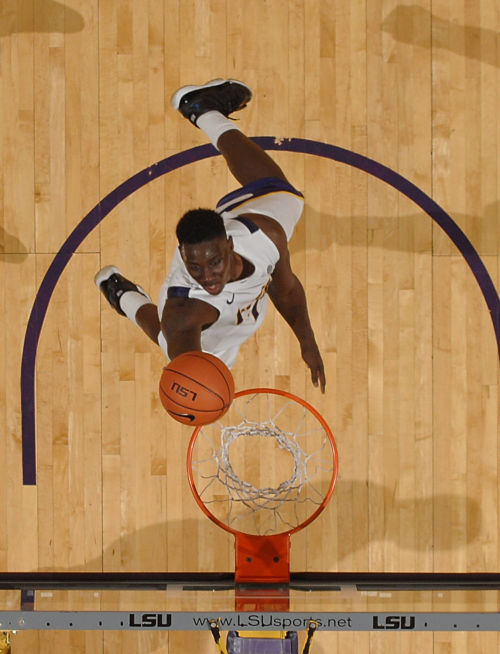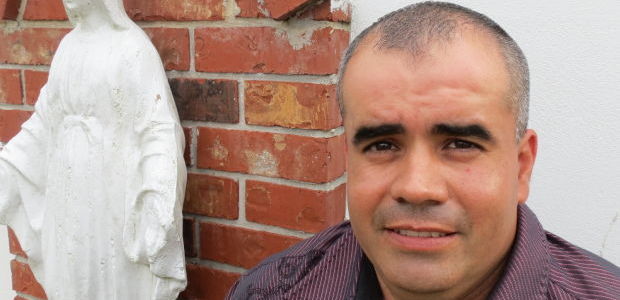
LSU, NSU fall in conference tourney
March 19, 2013Support for Jindal tax plan growing
March 19, 2013Juan Francisco Hernandez was in his Raceland home last week, watching television, when he learned that Jorge Mario Bergoglio was chosen to be the 266th Pope of the Roman Catholic Church.
Tears came to the 36-year-old restaurant worker’s eyes not only because Pope Francis I, like himself and his family members, is a speaker of Spanish, nor because he is from Juan’s homeland of Argentina.
It was all more personal than that.
In Cordoba, Argentina’s second-largest city, first as a boy and later as a soldier, Juan had witnessed moments of the new pope’s ministry first-hand, when the pontiff-to-be was a Bishop.
“He would walk with the people and tell everybody hi,” Juan said in his native Spanish, as his wife, Maria, translated. A desire to be close to the people, to commune in the same way Juan recalls, has already been seen as an aspect of Francis’ papacy, with international news outlets noting that he gave Vatican security forces some nervous moments after his first Sunday mass as pope.
The selection of the pope, which came more rapidly than some observers had predicted, was greeted warmly in the Diocese of Houma-Thibodaux, where Bishop Sam Jacobs celebrated a commemorative mass at St. Joseph Co-Cathedral.
“Habemus Papam,” Jacobs announced in Latin. “We have a Pope.”
The Diocese, Jacobs said, welcomes the new pope as the Catholic Holy Father with great joy.
“At this time in the Catholic Church’s history that the cardinals would choose someone from Latin America is of tremendous significance,” Jacobs said. “It is an affirmation and recognition of the growing church in Latin America. It is likewise significant that they sought a spiritual man, a humble man and a man of the people. I believe he will continue in the path that John Paul II and Benedict XVI have forged leading the church in proclaiming the sacred teachings which have been part of the church from the beginning.”
In response to a question from the Tri-Parish Times, Jacobs later commented on the importance of the papal election’s timing.
“I am delighted that our new Holy Father was elected so quickly, especially because it did not leave the holy seat vacant for a long period of time,” Jacobs said. “Additionally, his election and installation now enable him to lead the universal church from its somber observance of Holy Week into the joyous celebration of Easter.”
With church in Lafourche, Terrebonne and parts of St. Mary, Jefferson, St. Martin and Assumption parishes, the Houma-Thibodaux Diocese covers about 3,500 square miles. Catholics make up more than half of the overall population, an estimated 126,000 of the area’s 202,000 people. In that sense, church and civic leaders agree, selection of a new pope did and shall have a strong spiritual impact on the region.
That selection of a new pope has strong implications for Catholics is inarguable.
The selection of this particular pope – the first ever from the Americas and from Latin America at that – has tremendous significance for Spanish-speaking local Catholics, with implications they say will be felt locally as well as in their native lands.
The strong wave of anti-immigrant sentiment prevalent in the U.S. that has seen the status of guest workers transformed into political footballs, the vulnerability of Spanish-speaking residents to crime as addressed by local police agencies and the overall status of Hispanics are what has largely defined the response of the bigger society toward them, advocates say. The national anti-immigrant sentiment, some local Catholics note, keeps many among them in hiding, some shunning the Spanish-speaking masses held at local churches for fear of identification or contact with immigration authorities. In some cases men and women who live here have immigrated from other nations while still children. The new pope’s Argentine heritage, some say, could work to relieve some of the stigma, and also bring more Spanish-speaking Catholics to become more involved in local churches.
But there is more to it than that, notes Juan’s wife, Maria, herself a native of Mexico, who sees the pope’s election as a benefit to people who still live there and in other nations undergoing upheaval.
“He will go to these other countries I am sure,” Maria said. “In these countries, in Mexico, it is so scary, there is so much violence, people changing religions, problems with the governments, this will bring them closer to the church, helping guide them to a better world.”
Francis I, as a church leader in Argentina, is no stranger to controversy born of South America’s political turmoil. Old accusations resurfaced after the papal election, that he had failed to stand up for two Jesuit priests who were arrested and held prisoner by the Argentine military during its so-called “Dirty War” against government opponents, in which tens of thousands of leftist guerillas and sympathizers as well as innocent citizens were murdered, tortured and jailed.
The Vatican has publicly denied those reports, which Juan said are news to him.
His own recollections of Francis involves when he was 13 or 14 years old, active in a Cordoba Catholic youth group. The bishop occasionally said mass and on some occasions Juan received communion from him, never imagining that the hand which placed what Catholics maintain is the body of Christ upon his tongue would be one that might one day hold the crook for the world’s entire Catholic frock.
When he served in the Argentine military years later Juan met the holy yet again, as he ministered to the nation’s men and women in uniform as Archbishop of Buenos Aires, with a voice as soft as that he remembered from his teen years in Cordoba, a mountain town full of churches, whose chief industry is manufacturing.
He regularly attends the Missa Hispanica, the Spanish-language mass at Christ the Redeemer Church in Thibodaux. After arriving there Sunday he surprised the Rev. Isaias Galvez, a native of Honduras, with news of his pre-papal encounters with Francis I.
“It is a good thing,” said Galvez.
Now cooking for a living at the El Cajun La-Mex Restaurant on La. Highway 182, Juan has become equally proficient at dishing up jambalaya or burritos. And food figures into what he might have to say should he ever meet his former countryman again.
“I would say hello and if he would remember me, tell him hello like they do in Argentina, and ask him to join me for some churrasco,” Juan said through Maria’s translation. “I would tell him that I feel closer to God, and hope that he could help all the people that left the church to come back and especially to help the young, to guide them to the right way.”
Juan Hernandez speaks about Pope Francis I prior to Sunday Mass at Christ the Redeemer Church in Thibodaux.










